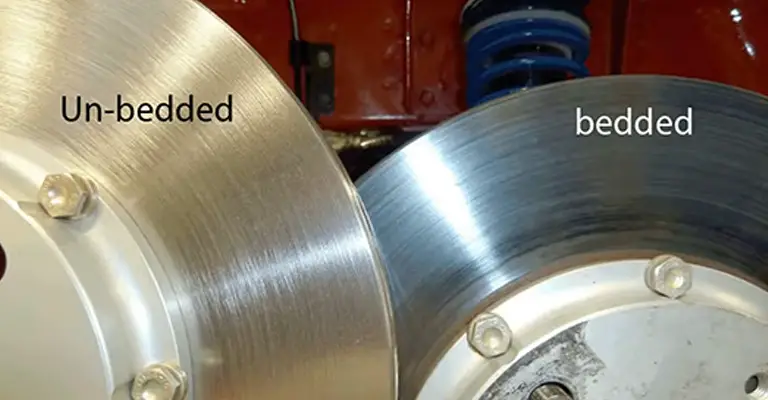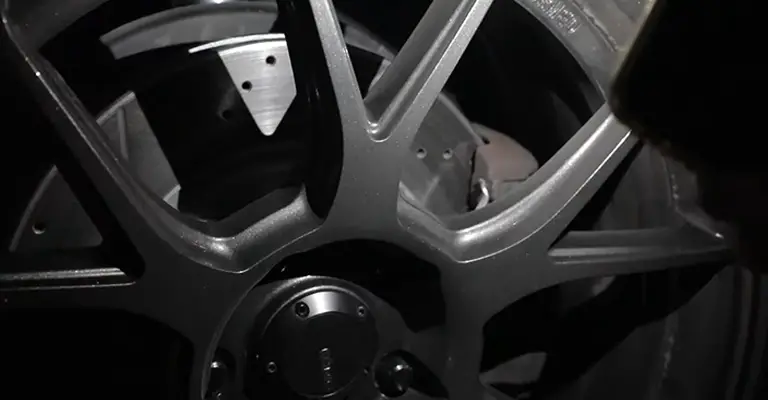Several brake system complications like uneven braking, reduction of braking power, noisy brake pads, possible reduction in lifespan of brake pads, etc. can occur if you do not bed in brake pads. As a result, your whole driving experience will be hampered and you will not get the best performance out of your brake system.
What Happens if You Don’t Bed in Brake Pads?
If you want your vehicle to provide you with the best performance and experience then you have to bed your brake pads. Because if you do not bed the brake pads it may cause damages to your braking system like ‘warping’ the rotor. Moreover, it may give you a rough braking experience.

What is Bedding the Brake Pads?
Brake pads and brake rotors are two important components of the brake system. Do you know what stops your car when you step on the brakes? It is the friction between your car’s brake pad and brake rotor. To be more specific, the friction between the brake pad and the thin film of brake pad material on the brake rotor.
This deposition of brake pad material on the surface of the fresh brake rotor is known as bedding. When you first buy a brake pad and rotor and go through the bedding procedure, the brake pads lay out a thin shiny, grey-blue grazed film of pad material on the surface of the rotor under high temperature and friction.
Reason for the Thin Film
When you step on the brakes, the brake pad and the brake rotor come in contact. Brake pads contacting with the metal surface of the rotor do not function properly. On the other hand, the brake pad pressing against pad material over the metal surface results in better friction and smoother stopping of the vehicle.
Consequences of not Bedding Brake Pads
You cannot enjoy the benefits of bedding the brake pads rather you have to suffer from its harmful consequence if you don’t bed the brake pads. Even if you do not go through the bedding procedure, the brake pad still transfers pad material on the rotor surface after driving. However, this will create an uneven film or imprint on the rotor which may seem like a ‘warped’ rotor. Consequently, you may face many issues regarding the functions of the brake system of your vehicle.
Uneven Braking
Due to the random and uneven distribution of the pad material on the rotor surface, all the brakes of the vehicle function in a disproportionate way. Meaning that one side of the brake system may work better or stronger than the other side. This condition is called uneven braking.
Therefore, when you step on the brake one side of the system will exert more friction than the other. As a result, the vehicle will be pulled in that direction. And you will not be able to stop the car in a straight line.
Reduced Braking Power
Brake pads that are not bedded, interfere with the ability of the brake system to stop the vehicle. Due to the patchy film, the interaction between the brake pad and rotor is not smooth. Thus, the brake system often cannot provide adequate friction to stop the vehicle timely.
Noisy Brakes
If you do not bed the brake pads, there is a higher chance of your brake system being noisy because of the misalignment between the brake pad and rotor. Whenever you will step on the brake you may hear the annoying squeaking or squealing sound of the brake due to the ‘warped’ rotor. Replacing them is the only option.
Possibility of Reduction in Lifespan of the Brake Pads
Not bedding the brake pad may have a slight effect on the lifespan of the brake pad. Uneven braking, ‘warped’ rotor may lead to a slight decrease in the lifespan of the brake pad. However, generally, that is insignificant.
Uncomfortable Braking Experience
Overall, all the issues lead to uneasy driving experiences. Uneven braking can pull you in an unwanted direction. A reduction in braking power may make you unsure of your grip on the brakes. Additionally, the noisy brakes can distract and irritate you during driving.
Therefore, not bedding your brake pads may give you a feeling of discomfort while driving. Also, it will lead to the inability of acquiring the maximum results while driving.
How to Bed-in Brake Pads
You need to perform this procedure on a long safe road. But try to avoid the highway as you cannot stop frequently on the highway. However different brake pads may require different procedures of bed in. So, it is better to follow the manufacturer’s guide. But here is a general idea of bedding brake pads.
Warm-Up
Drive up to 35mph and drop down to 5mph with decent braking. Do this procedure 4 times and try to apply the brake a little harder than normal braking.
Bed-in
Execute hard stops ranging from 50 mph to 5 mph. Without locking up the wheels conduct these aggressive brakes. However, do not stop the vehicle entirely. Once the vehicle is slowed down, promptly accelerate up to 60 mph. Perform this process 8 times.
Cool Down
After conducting the bed-in process, drive your vehicle for 5-10 minutes at a slow speed to let the brake system cool down. Try to do this without frequent braking. Then, park your vehicle and rest it for about an hour to let the cooldown finish.

FAQ
1. Is it really necessary to bed in brakes?
Yes, it is necessary to bed in brakes. If you want to gain the maximum result from the brake system then follow the bed-in procedure given by the manufacturer.
2. How long does it take for new brake pads to bed in?
Generally, it takes no more than 20 minutes to complete the bed-in procedure. Perform sets of braking from high speed to almost stoppage.
3. Do dealerships bed in brakes?
No, mechanics do not perform the process of bedding brake pads. You need to carry it out yourself by following the manufacturer’s guide.
4. How long do brake pads last?
The lifespan range of brake pads varies with different types and brands. Nonetheless, typically brake pads last between 20,000 and 65,000 miles.
Conclusion
Though not bedding your brake pads has many drawbacks, however, it is not a life-threatening issue. Many people drive without performing the bed-in method and face no extreme complications due to it. However, it is without a doubt that in that case you will not experience the maximum performance and may face some minor issues.
